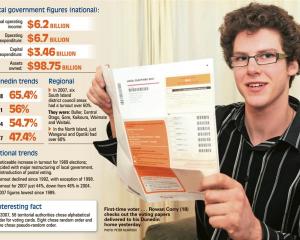Expected changes to the way the New Zealand Transport Agency allows councils to contract for road maintenance prompted spirited debate at the Queenstown Lakes District Council utilities committee meeting on Tuesday.
Cr Vanessa Van Uden objected to the suggestion that the committee agree to extend the council's contract with Works Infrastructure Ltd by five months to September next year.
The contract is due to be re-tendered in April, but QLDC roading manager Ian Marshall said starting a new contract with a new company just before winter was a "substantial risk" and that council staff also wanted to extend the contract to see in the New Zealand Transport Agency's new regulations on procurement.
Cr Van Uden said the experience of working through a winter was the best way for a new contractor to start.
"To know what streets freeze, what streets have snow . . . you need a winter to get experience," she said.
Cr Van Uden said tenders should go out as planned and she found it "astonishing" that $200,000 had been put aside in the 2008-09 District plan for the redrafting of contracts "that have been done before".
"I don't believe roading is difficult."
Engineering manager Mark Kunath said there were benefits to having longer contracts - the contractor would be able to manage the road better and more independently from council directives.
Committee chairman, Cr John Mann said the committee needed to trust the expertise of staff.
Cr Van Uden tried to change the recommendation to tender the contract in April as originally planned, but lost the motion on the chairman's casting vote.
She successfully entered an additional clause to have a breakdown of what the $200,000 budgeted for the re-writing of the contracts by the next utilities committee meeting.
•Water restrictors and meters may be installed around Wakatipu - especially in Lake Hayes as heavy water users are using too much water.
Queenstown Lakes District ratepayers are to be canvassed for opinions on a new water demand strategy which may include water meters and restrictions on water supply.
The council's acting water services manager John Porter gave Tuesday's committee meeting a range of options to resolving water shortages in various areas including water flow restrictors.
Metering could be an option, but it would be hard to make only the water wasters pay, utilities committee chairman Cr John Mann said.
He said it was "very hard" not to penalise more cautious residents, although it was a minority wasting the most of the water.
The Lake Hayes water demand management report prepared by MWH also warned installing meters on high-use properties and making them bear the cost of monitoring would "reduce demand but [was] unlikely to reduce all properties below 2.1 cubic metres per day".
General metering also raised "political issues associated with introduction of water rates" and consultation would be required".
Water restrictors could be used to cap usage at 2.1 cu m, although this was noted as "not the preferred option" because it lowered service standards.
Lake Hayes regularly suffers water shortages over summer - partly because a small percentage of people use more than 2.1 cu m of water daily.
Even with restrictions, upgrading the Lake Hayes reservoir by either doubling its capacity or building a second was necessary for the QLDC to meet fire-fighting reserve requirements, Mr Porter said.



